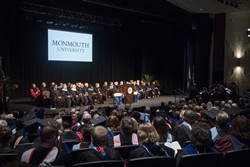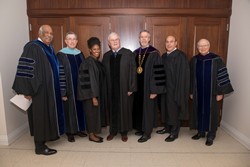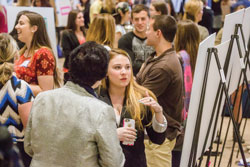Members of the community gathered to celebrate the University’s 85th anniversary of Founders’ Day. The Convocation Ceremony took place in Pollak Theatre on Wednesday, Oct. 10.
Founders’ Day is a campus-wide event that celebrates Monmouth University’s founding in 1933. The first Founders’ Day was held in 1983 as a part of the University’s 50th anniversary celebration and has since become a University tradition.
The Convocation Address is delivered by a guest selected by the University each year. This year the speaker selected was New Jersey’s Secretary of Higher Education, Zakiya Smith Ellis, wherein she is responsible for policy development and coordination of higher education activities for the state. She was awarded an honorary doctorate of public service.
“The history of Monmouth University is rich and deep, and steeped in public service,” said Ellis in her address. “It is wonderful that that spirit of service remains with the institution to this day.”
Ellis said that the purpose of education is to prepare individuals for life as a public citizen, and that she has been able to harness her own passion for teaching others and utilize it in advising policymakers. Ellis served as a senior advisor for education at the White House Domestic Policy Council and in the U.S. Department of Education, where she proposed solutions to respond to issues like access to higher education, and college affordability and completion.
“Whatever your idea is; whatever it is that you think would make the world a better place, there’s a place to bridge your passion and that idea in public service,” she said. “Figure out your passion and figure out a way to make your own place in public service.”
 Barry H. Ostrowsky, President and CEO of RWJBarnabas Health, received the Maurice Pollak Award for Distinguished Community Service, for enriching the quality and scope of health care throughout New Jersey during his career.
Barry H. Ostrowsky, President and CEO of RWJBarnabas Health, received the Maurice Pollak Award for Distinguished Community Service, for enriching the quality and scope of health care throughout New Jersey during his career.
“It’s an honor for me to accept this incredible award named after someone (Maurice Pollak) who is a humanitarian and understood the importance of investing in the community and people who live in the community,” he told the audience. “We believe that our responsibility is not simply clinical care, but to invest in our community in a way to ensure that each and every member of our community can have a healthier and happier life.”
Ostrowsky has formed New Jersey’s largest and most comprehensive academic health system through RWJBarnabas Health and Rutgers University. Their partnership is dedicated to providing high-quality patient care, leading-edge research, and world-class health and medical education aimed at transforming and advancing health care in New Jersey.
The ceremony also recognized H. William Mullaney (Class of 1960) with an honorary doctorate of humane letters, to recognize his dedication to the University. Mullaney is a member of the Society of Trustees and a former member of the Board of Trustees. He and his wife, Sandy, are the namesake of Mullaney Hall.
“Thank you for this great honor, the highest of my life,” he said. “The best part of my life started here at Monmouth. My first date with Sandy was at Wilson Hall.”
“[Sandy and I] have watched this school in quality, every kind of quality. From a small college with classes in ‘chicken coups’ to a world-class university known throughout the world,” he said.
This year’s Founders’ Day marked the start of a new tradition at the University: the Dr. Martin Luther King Jr., Distinguished Speaker in Social Justice Series. “This initiative grew out of prolonged discussions on how we can further strengthen the University’s longstanding commitment to promoting social justice, and at the same time celebrates this institution’s historical connection to Dr. King,” said University President Grey Dimenna, Esq., in an email addressing students of the event.
As a special event that was a part of the day’s educational programming, Ruha Benjamin, Ph.D., an associate professor of African American Studies at Princeton University, provided the inaugural lecture in Pollak Theatre prior to the Convocation Ceremony.
Benjamin spoke about “envisioning social change,” and addressed the ways in which racism continues to affect society, permeating through history, laws, and institutions, preventing such change from happening. She encouraged the audience to use their innate human ability to begin to weave a more equitable society through the creation of new patterns, politics, and practices.
She continued and said that this process starts by individuals expanding their imaginations of what is socially possible and questioning the world around them, while also warning that this would not be an easy feat. “We act as if standing up for justice is going to make us feel good or make us popular,” said Benjamin. “In fact, it’s going to make us uncomfortable and we will experience hardship.”
“We cannot return to a past when human rights were a radical idea,” said Walter Greason, Ph.D., Chair of the Department of Educational Counseling and Leadership, and most recent Dean of the Honors School. “[Benjamin’s] work on the future of science and its social implications are crucial because there is an increasing danger of misusing science to reinforce inequities around the world.”
Greason continued, “One of her most powerful points was the ongoing power of redlining. It is a specific example of the ways that social science data denied human rights to millions of people. Sadly, the consequences of these tools that reinforce segregation continue to influence business leaders and public policy today.”
From her specialization in the interdisciplinary study of science, medicine, and technology; race-ethnicity and gender; and knowledge and power, Benjamin drew on her expertise to identify what she refers to as “selective imagination” and being “strategically realistic.” She explains that if cardiac cells can be grown in a petri dish in a lab then “…we can grow empathy for each other.”
PHOTO COURTESY of Monmouth University



